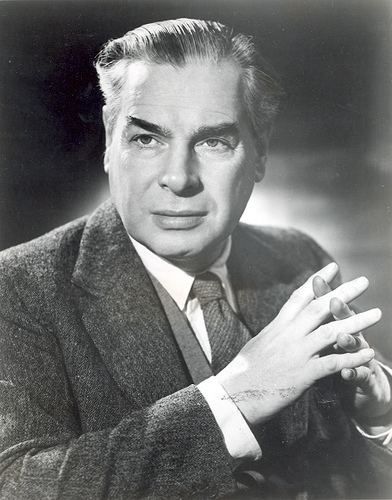1971
Our President in 1971/2 was:
Robert Speaight
He proposed the Toast to Sir Walter at our 64th Annual Dinner on Friday 3rd March 1972 in The North British Hotel
Download the [transcript] or read the [bulletin]
Summary of the Speech:
Robert Speaight delivered a reflective, witty, and deeply literary tribute to Sir Walter Scott. Blending personal anecdotes with broader cultural observations, he offered a powerful meditation on Scott’s legacy as both a writer and a national icon.
Key Themes and Points:
- Opening Anecdote & Humility:
- Speaight began with a humorous diplomatic story and expressed his awe at joining the ranks of previous distinguished toast-givers like Malcolm Muggeridge and Ludovic Kennedy.
- He humbly acknowledged his lack of Scottish ancestry and his outsider status, having first encountered Scotland only in adulthood.
- Early Love of Scott:
- He vividly recalled reading Scott’s novels as a boy, so obsessively that a doctor once blamed a fever on “excessive reading of Sir Walter Scott.”
- This early experience seeded a lifelong admiration.
- Scott’s Bicentenary Legacy:
- Now that the fanfare of Scott’s bicentenary had faded, Speaight suggested we return to what matters: the books.
- He characterised Scott’s modern readers as a “freemasonry of devotees,” quiet but faithful, resisting modern literary fashions.
- Scott’s Timeless Relevance:
- Scott, Speaight argued, does not quite fit the 19th century mould. He belongs spiritually to an older era, embodying a chivalric, morally rooted tradition that stood apart from contemporaries like Byron, Burns, Carlyle, or Dickens.
- Scott and Shakespeare:
- Speaight drew powerful links between Scott and Shakespeare, noting shared traits: moral depth without preaching, a command of language, and the ability to “stab you with a phrase.”
- Through examples from Woodstock and characters like Edie Ochiltree and Sir Henry Lee, he highlighted Scott’s ironic, affectionate homage to the Bard.
- Historical Scott:
- Drawing from Professor Trevor-Roper, he defended Scott as a historian—perhaps not rigorous, but imaginative and morally serious.
- He compared Scott’s portrait of Cromwell (from Woodstock) to modern political oratory, praising Scott’s clarity and irony.
- Literary Progeny and Admiration:
- Figures like Dostoevsky, Balzac, George Eliot, and C.S. Lewis admired Scott. Lewis in particular celebrated his “unself-conscious moral refinement.”
- Lord Rosebery and T.S. Eliot also praised Scott’s moral and personal stature.
- Scott’s Humanity & Tragedy:
- Speaight reflected movingly on Scott’s decline—facing bankruptcy and physical collapse, but continuing to write (Woodstock) with fortitude and grace.
- The Snuff-box: --- [See blog]
- The toast concluded with Speaight presenting a snuff-box once owned by Scott and inscribed to his solicitor John Gibson (dated 1832, the year of Scott’s death).
- This heirloom, gifted to Speaight by Lady Rostrevor-Hamilton, symbolised Scott’s gratitude and was offered to the Club for eventual safekeeping.
Noteworthy Observations:
- Tone: The speech mixed humour, literary insight, reverence, and personal warmth. Speaight’s performance background gave the toast a dramatic, almost theatrical richness.
- Literary Depth: References ranged from Shakespeare and Michelet to G.A. Henty and Georges Simenon.
- Aesthetic Critique: He wryly noted that Scott’s statue “broods over the wrong street” (Princes Street), and perhaps should face the Old Town to better reflect his spirit.
- Legacy Message: Scott’s greatness lies not in popularity or fashion but in timeless moral clarity, narrative genius, and an “inner serenity that belongs to great writers who are also great men.”
Download the [transcript] or read the [bulletin]

Subsidiary Toasts
After the Toast to the Queen had been honoured, the Chairman proposed “The City of Edinburgh”, to which the Right Hon. Sir James McKay, the Lord Provost, replied.
The Toast of “Her Majesty’s Forces” was proposed by Mr W. S. McIntosh Reid, M.C., T.D., B.Com., Master of the Merchant Company, and the reply was made by Rear-Admiral D. A. Dunbar-Nasmith, C.B., D.S.C., Flag Officer Scotland and Northern Ireland.
The Toast to “The Chairman” was proposed by the Rev. Ronald Selby Wright, C.V.O., T.D., D.D


